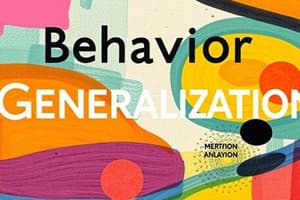Podcast
Questions and Answers
What is generalization in psychology?
What is generalization in psychology?
- The tendency to respond in a similar way to stimuli similar to the Conditioned Stimulus. (correct)
- Learned fear that only indicates what not to do.
- The learned ability to distinguish between a conditioned CS and other stimuli.
- A learned association between a behavior and its consequences.
Define discrimination in psychology.
Define discrimination in psychology.
The learned ability to distinguish between a conditioned CS and other stimuli.
What did Watson and Little Albert's study demonstrate?
What did Watson and Little Albert's study demonstrate?
Children bitten by a dog may generalize fear to other dogs.
What is a benefit of generalization?
What is a benefit of generalization?
Define operant conditioning.
Define operant conditioning.
In operant conditioning, behavior is the ______ and consequences are the ______.
In operant conditioning, behavior is the ______ and consequences are the ______.
What is positive reinforcement?
What is positive reinforcement?
Provide an example of negative reinforcement.
Provide an example of negative reinforcement.
What is positive punishment?
What is positive punishment?
What is an example of negative punishment?
What is an example of negative punishment?
What are some problems associated with punishment?
What are some problems associated with punishment?
Study Notes
Generalization
- Refers to the tendency to respond similarly to stimuli that resemble a conditioned stimulus after a response has been conditioned.
Discrimination
- Involves the ability to differentiate between a conditioned stimulus and other non-related stimuli to avoid inappropriate responses.
Watson and Little Albert
- Demonstrated that a child's fear from being bitten by a dog can lead to generalized fear towards other dogs.
Benefits of Generalization
- Allows for the application of learned responses to similar situations or objects, reducing the need for multiple experiences to develop a response.
Operant Conditioning
- Involves forming an association between specific behaviors (operants) and their outcomes or consequences.
Behavior vs. Consequence
- Behavior triggers an outcome; for example, drinking coffee (behavior) results in feeling energized (consequence).
Positive Reinforcement
- Involves increasing the likelihood of a behavior through pleasant outcomes, such as feeling better after exercising.
Negative Reinforcement
- Occurs when a behavior leads to the removal of an unpleasant stimulus, like buckling a seatbelt to eliminate a noise, taking aspirin to relieve pain, or using an umbrella to stay dry.
Positive Punishment
- Involves presenting an unpleasant consequence following a behavior, exemplified by receiving a parking fine.
Negative Punishment
- Involves the removal of a pleasant stimulus following inappropriate behavior, such as losing phone privileges.
Problems with Punishment
- Can lead to unintended consequences like learned fear, promote aggressive behavior, and only inform individuals about undesirable actions without guidance on appropriate alternatives.
Studying That Suits You
Use AI to generate personalized quizzes and flashcards to suit your learning preferences.
Description
Explore the concepts of generalization and discrimination in psychology through this interactive flashcard quiz. Learn how conditioned responses can be applied to similar stimuli and how individuals can discern between different stimuli. Perfect for students studying behaviorism!




